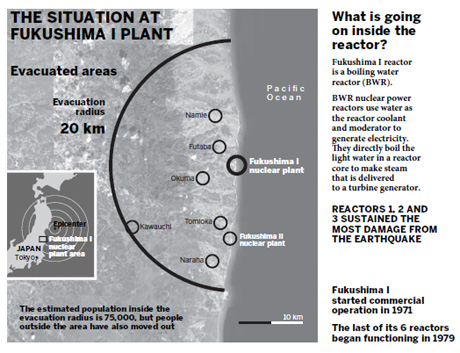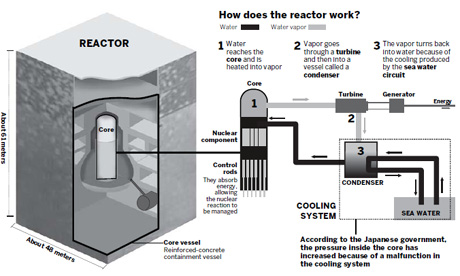'Nuclear meltdown'
Broadcaster NHK, quoting a police official, said more than 10,000 people may have been killed.
Almost 2 million households were without power in the freezing north, the government said. There were about 1.4 million without running water.
Kyodo said about 300,000 people were evacuated nationwide, many seeking refuge in shelters, wrapped in blankets, some clutching each other, sobbing.
Tokyo Electric Power says it will ration electricity with rolling blackouts in parts of Tokyo and other Japanese cities.
Deng Wei, Chinese embassy spokesman in Tokyo, said on Sunday that there are, so far, no reports of Chinese casualties but Kyodo reported that 40 Chinese trainees sent by a service company in Shandong province have lost contact after the earthquake. Embassy staff members are working hard to track all Chinese citizens in Japan, Deng said.
Authorities in Japan have set up a 20-km exclusion zone around the Fukushima Daiichi plant and a 10-km zone around another plant nearby. About 170,000 people have been moved out, while authorities prepared to distribute iodine to protect people from radioactive exposure.
The nuclear accident, the worst since the Chernobyl disaster in 1986, sparked stinging criticism that authorities were ill-prepared for such a massive quake and the threat that could pose to the country's nuclear power industry.
Kan said on Sunday the crisis was not the same as Chernobyl.
"Radiation has been released in the air, but there are no reports that a large amount was released," Jiji news agency quoted him as saying. "We are working to prevent damage from spreading."
Japanese officials said they had also ordered up the largest mobilization of their Self-Defense Forces since World War II to assist in the relief effort.
The Chinese International Search and Rescue Team arrived in Japan on Sunday - the first time the government has accepted assistance from China for disaster relief.
The 15 team members took with them four tons of materials and equipment for search and rescue, power supply and telecommunication. They began their work in Iwate prefecture. More than 30,000 Chinese nationals are estimated to live in Iwate and the other two most seriously damaged prefectures, Miyagi and Fukujima.
Renewed public concern
Meanwhile, nuclear safety worries are rising. Authorities in both Russia and China, Japan's two biggest neighbors, have been closely monitoring radiation levels along their shores.
China intensified its monitoring in Beijing and the 11 coastal provinces after Saturday's explosion. The data showed that by Sunday evening, China had not been affected, according to the Ministry of Environmental Protection.
Experts at State Nuclear Power Technology Corp Ltd agreed unanimously Sunday morning that, if information from Japan were accurate, the crisis would have "far less catastrophic effect" even at its worst than the explosion and fire at Chernobyl though it could be more disastrous than the partial core meltdown at Three Mile Island in 1979.
The incident will have "minimal effect" on China, the experts wrote in an internal assessment that was submitted to the National Nuclear Safety Administration, said an insider who requested anonymity because no official announcement had been made.
 0
0 









Go to Forum >>0 Comments